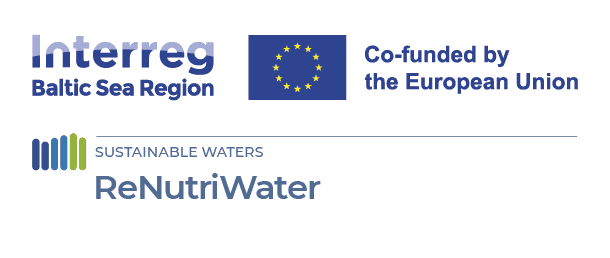Water Recycling – Time for a Paradigm Shift
Project: ReNutriWater
Physical Meeting
10. December 2025
09:00 - 17:00 (CET)

ReNutriWater has reached the end of its project journey and has been actively sharing its results. Discover the project results insights on water reuse and nutrient recovery by watching the final results webinar recording, the project outcomes film, or by reading our latest news from the project concluding seminar.
ReNutriWater aimed to advance sustainable water management across the Baltic Sea Region by demonstrating how treated wastewater and its valuable nutrients can be safely and economically reclaimed and reused. By preserving nutrients in reclaimed water, the project sought to combat eutrophication of the Baltic Sea, reduce the need for artificial fertilisers, and support circular solutions for cities, municipalities, utilities, and other stakeholders.
Freshwater scarcity is becoming increasingly urgent due to climate change, population pressure, pollution, and prolonged droughts. That makes innovative water management essential. ReNutriWater has shown how wastewater — after appropriate treatment — can serve as a valuable resource rather than being discharged after a single use. The project focused on closing local water cycles by reclaiming wastewater and utilising retained nutrients for beneficial purposes.
A central environmental challenge in the Baltic Sea Region is eutrophication — nutrient-driven degradation of water quality. By recovering and reusing nutrients such as nitrogen and phosphorus within treated water, the project reduced reliance on artificial fertilisers while curbing nutrient loads entering water bodies.
ReNutriWater was structured around pilot activities in Poland, Finland, Latvia, Lithuania, and Denmark, reflecting varied geographical and operational contexts. These pilots explored methods for:
By collecting data from these varied environments, the project generated evidence based insights for cities, utilities, and rural practitioners on how to plan, manage, and scale water reuse solutions.
The project delivered a portfolio of outputs designed to support practitioners, policymakers and utilities in implementing water reuse:
ReNutriWater actively facilitated local and international knowledge exchange through workshops, events and presentations, contributing to broader discussions on water reuse and circular water economies.
A key example was the final project webinar (“Water Reuse and Nutrient Recovery — Results from ReNutriWater”), and the final event (“Water Recycling – Time for a Paradigm Shift”), where experts shared technical findings, pilot experiences, business model perspectives, and strategic guidance for future work in sustainable water management. These events brought together researchers, practitioners, utilities and policymakers to reflect on practical next steps for water reuse in the Baltic Sea Region and beyond.
Additionally, ReNutriWater hosted various local, national and international interactive workshops engaging educational institutions and stakeholders in discussions about public perceptions, technological barriers, and future innovation opportunities.
ReNutriWater aligns with the EU Strategy for the Baltic Sea Region (EUSBSR), particularly the efforts of Policy Area Nutri and Policy Area Tourism to reduce nutrient pollution and improve water sustainability. Its outputs contribute directly to regional and EU water strategies, including the EU’s broader water agenda, while supporting the achievement of SDG 6 (Clean Water and Sanitation) through innovative, safe, and adaptive approaches to water reuse that strengthen climate-resilient water systems. By coupling scientific insights with stakeholder engagement, practical tools, and strategic guidance, the project has enabled municipalities, utilities, and industries to view water reuse not merely as a technical solution but as a long-term economic, environmental, and social opportunity.
ReNutriWater’s legacy is a stronger foundation for continued innovation, collaboration, and knowledge exchange, helping the Baltic Sea Region move toward resilient water cycles and circular resource use.
Project: ReNutriWater
Physical Meeting
10. December 2025
09:00 - 17:00 (CET)
Project: ReNutriWater
Virtual Meeting
03. December 2025
10:00 - 11:30 (CET)
Project: ReNutriWater
Virtual Meeting
11. November 2025
14:00 - 15:00 (EET)
Project: ReNutriWater
Virtual Meeting
01. October 2025
14:00 - 15:00 (EEST)
Project: ReNutriWater
Virtual Meeting
03. September 2025
14:00 - 15:00 (EEST)
Project: ReNutriWater
Virtual Meeting
13. August 2025
14:00 - 15:00 (EEST)
Project: ReNutriWater
Virtual Meeting
09. June 2025
13:00 - 16:00 (EET)
Project: ReNutriWater
Physical Meeting
18. February 2025
13:35 - 14:50 (EET)
Project: ReNutriWater
Virtual Meeting & Physical Meeting
28. November 2024
13:00 - 14:20 (CET)
Project: ReNutriWater
Physical Meeting
30. October 2024
14:30 - 16:00 (CET)
Project: ReNutriWater
Virtual Meeting & Physical Meeting
28. August 2024
14:00 - 14:45 (EET)
Interactive map showing pilot locations. Use the arrow keys to move the map view and the zoom controls to zoom in or out. Press the Tab key to navigate between markers. Press Enter or click a marker to view pilot project details.